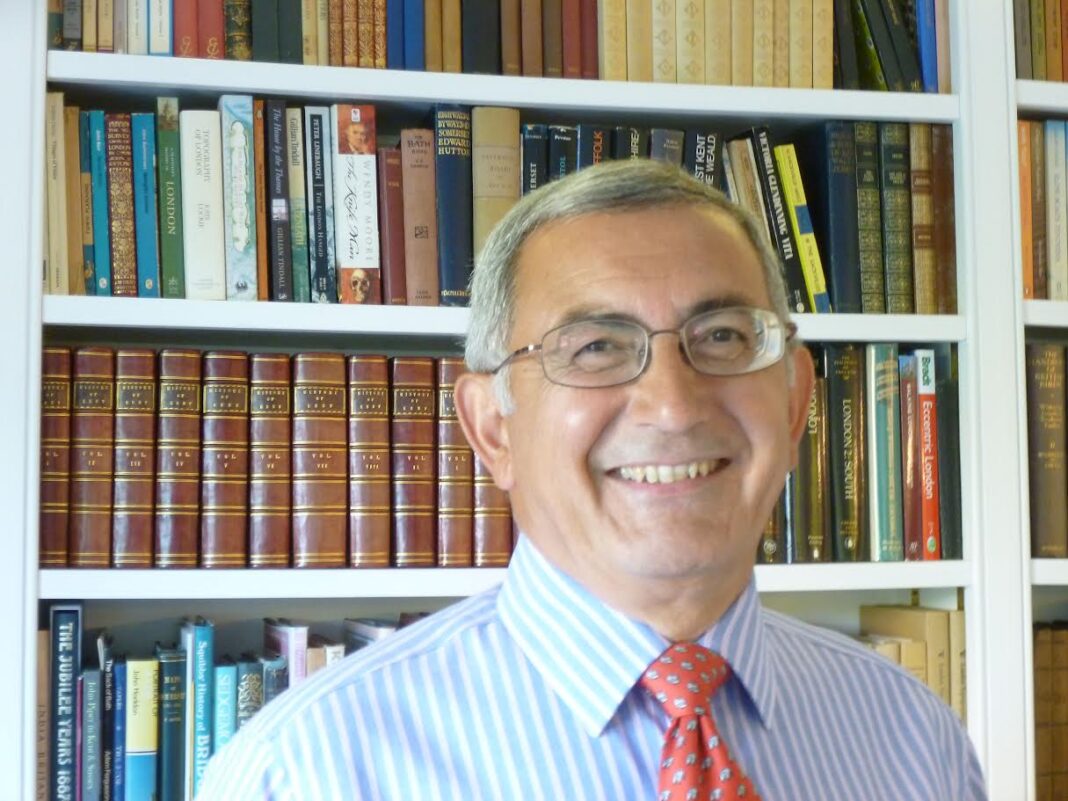Dr Andrew Bamji qualified in medicine from the Middlesex Hospital, University of London in 1973, and was a consultant (rheumatology and rehabilitation) at Queen Mary’s Hospital, Sidcup for 28 years. Now living in Rye, he reflects on the Covid pandemic in his latest book.
My concern about published commentaries on the coronavirus saga was that many of them were written too soon, and to enshrine opinions in a book was to risk the possibility of new facts emerging that would undermine the narrative. This is indeed what has happened.
I began a blog at the beginning of 2020, and although I suspect there is more evidence that will emerge – and maybe undermine my contributions also – the pandemic is well and truly over, and its five-year anniversary has passed. Making a book of my blogs has been a long process, not least because of the need to check references and web links, but finally, after over 200,000 words, I have finished. The paperback version runs to almost 600 pages.
A New Journal of the Plague Year(s) or: The Great Pan(dem)ic pays homage to Daniel Defoe’s account of the Great Plague of 1665, and is a day to day account of the evolution of the coronavirus pandemic and officialdom’s response to it. Its repetition underlines my personal experience of offering advice, soundly based in clinical medicine, yet being completely ignored by both government and the mainstream media.
As a rheumatologist I worked from an understanding of immunological disease. I (with a few others) rapidly divined the reason why coronavirus infection could lead to sudden severe illness and death. As early as April 2020 I outlined the necessary tests to identify the development of severe illness and the necessary treatment. Being retired I had time to offer my advice in person to the SAGE committee which advised the government, and the government itself.
Not one of my communications was acknowledged, let alone acted upon. As a result I believe that several thousand deaths might have been avoided. I rapidly determined that the so-called experts were the wrong experts; that “The Science” on which decisions were based was not immutable; and that others who expressed contrarian views were side-lined just as I was – or even in some extreme cases lost their jobs for purveying so-called disinformation which was undermining government propaganda statements. Strange and unscientific theories were peddled not only by government but by supposed medical experts.
As time passed, and the official narrative on the origin of the coronavirus became less and less tenable, so too did the narrative on the effectiveness of lockdowns, school closures and vaccination. Indeed in hindsight most (I admit not all) of the hypotheses of myself and others turned out to be correct. Yet no-one in power, here or indeed anywhere else in the world, has had the honesty to admit that they were wrong and even now valid research papers are being turned down for publication or withdrawn after their appearance for secretive and often nefarious reasons.
Even facts change, possibly because they never were facts in reality. But if a hypothesis does not fit the facts it is the hypothesis that is wrong.
The Hallett Inquiry will be a failure because it is predicated on the official narrative; as I have previously written in the Daily Sceptic, it is censoring evidence submitted to it, including mine, insulting the few “dissidents” called before it and, in my view, is an example of the wrong experts (the lawyers) asking the wrong people the wrong questions. My own summary of required pandemic management, which I submitted early in 2020, is that if a new infection doesn’t on the whole cause more than a relatively minor illness there is no need to do anything except identify and treat those who do become seriously ill.
My New Journal is the only diarised experience of the pandemic written by a medical person. It asks why so many supposedly eminent and intelligent people stopped up their ears and refused to listen or engage in discussion, and not least failed to learn the lessons of history. It examines research findings as they occur; it looks critically at management failures, statistical failures, research failures and ethical failures. It has gaps, and careful readers will note that I made mistakes. But unlike so many in authority I admit them. It is difficult being the modern equivalent of Galileo but at least I could not be sacked from my retirement.
My consolation is that the failures and cover-ups evident in the pandemic have encouraged a new, widespread critical analysis of research, and this has begun to spill over into other disciplines. That can only be a good thing, so long as this sad five years has not permanently destroyed public confidence in medicine and science.
A New Journal of the Plague Year(s) or: The Great Pan(dem)ic is available on Amazon Kindle at https://www.amazon.co.uk/dp/B0F1ZHQTT2, price £6.99. The book version (£24.99) will be available shortly.
This piece was first published in the Daily Sceptic on March 22 2025.
Image Credits: Andrew Bamji .




An interesting article. I wish Andrew’s book to be a success. Thus his views and in depth study can be reviewed by those with science and medical knowledge and others of different disciplines . So our knowledge can be expanded and better outcomes for humanity will prevail. His last paragraph in the article at least gave us hope. And all those who can contribute must make sure public confidence in medicine and science does prevail. Schools must be the beginning of this knowledge of science and critical thinking taught. So freedom of ideas will be paramount. That different opinions and voices heard. That hypothosies that have been show to be invalid to be truthfully acknowledged . Honesty, integrity and humility will prevail .
.
.